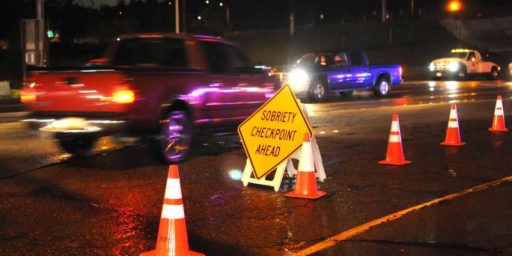Why Toxicology is So Slow
Unlike TV, real life medical examiners take weeks, even months, to establish a cause of death.
Slate recycles an old Explainer piece on “What Makes Toxicology So Slow?”
The piece was published a couple years back on the occasion of the death of Kanye West’s mother and is being renewed in the wake of Whitney Houston’s untimely death. Those who grew up on TV shows where forensics experts establish a cause of death in 15 minutes are shocked to learn that it takes several weeks–if not months–to get back a simple toxicology report in real life.
The answer is that, in real life, there are multiple cases going on simultaneously and very limited staff and lab resources to handle them.
Because there’s a backlog. Analysts typically work on multiple cases at the same time, and they’re always behind schedule due to staff shortages. For example: The 20-person team at the Washington state toxicology lab, which will handle the Tamayo-Fajaro screening, handles approximately 10,000 cases per year. To make matters worse, toxicologists often serve two masters; when they’re not in the lab, they’re at court offering expert testimony. In Washington state, lab scientists may spend as much as two days a week on the witness stand while their blood samples languish in a refrigerator.
Thorough tox reports require lots of effort. First off, labs try to collect at least 25 mL of heart blood, 10 mL of peripheral blood, and 50-gram tissue samples from the subject’s brain, liver, and kidney. An analyst then carries out an alcohol screening and a generalized immunoassay test, which can detect broad-based drug groups like opiates or tranquillizers. In the event of a positive drug test, the analyst must complete a confirmation procedure, designed to ferret out the exact nature of the offending substance. Next, a supervisor reviews the analyst’s report and either approves the conclusions or requests more tests. This whole process, barring glitches or lengthy tests for hard-to-detect drugs like neuromuscular blockers, could take just a couple of days ifanalysts were able to devote themselves exclusively to a well-preserved specimen. (They rarely get this opportunity.)
Not every case proceeds up the lengthy toxicology queue in the same amount of time. Labs handle screening requests for living as well as deceased subjects, and the living get first priority. Some evidence gets rushed to the top of the list because of an upcoming court date or because it might shed light on an ongoing investigation.
I’m currently caught in this backlog following the death of my wife over the Thanksgiving weekend. It’s been ten weeks now and I’m still waiting.
Aside from the obvious closure issues, there’s a huge practical effect to this backlog: Without a completed toxicology report, there is no final death certificate. Without a final death certificate, insurance companies won’t pay off on life insurance policies. Indeed, they won’t even start processing the claim without one.
In my own case, I’m fortunate enough to be making a decent living and to have accumulated a decent amount of savings. But for a stay-at-home parent who has lost their breadwinner–or even a struggling family who lived paycheck to paycheck and depending on both partners bringing in money every two weeks–this inordinate wait can be financially devastating. People are surely losing their homes, having cars repossessed, and ruining their credit ratings trying to get by in the meantime.
Given that this is a problem created by government, it’s one that has to be solved by government. The most obvious–but prohibitively expensive–solution is to radically ramp up the government’s capacity to do toxicology analysis. A related–but probably even more expensive–solution would be to outsource the job to private industry. The cheapest solution would be to mandate that insurance pay off based on the preliminary death certificate absent strong reason to suspect suicide or foul play.
Laboratory glassware image via Shutterstock







This isn’t the only example of understaffed government laboratories. In many jurisdiction, there is a backlog lasting months if not years for DNA testing on rape kits, which means that a rapist can be out on the streets committing more crimes while a sample sits on a shelf waiting to be tested.
Real life isn’t like TV — you don’t say!
When I was in law school, LA Law was a hot new show. We used to have discussions over dinner as to which members of the firm should have been disbarred for ethical violations.
Hm..the rate of overall new job arrival rate must be equal to the overall job completion rate, though. Otherwise, the queue would grow ever longer. If the wait is always long, this suggests issues beyond purely capacity. If the average wait is long, this suggests too much jitter in the job arrival rate, which might solved by better queuing practices.
@Moosebreath:
With Arnie Becker usually at the top of the list, no doubt
Last year, in Bullcoming v. New Mexico, the USSC made the process likely even slower. Every case in which forensic evidence is produced now requires the technician who did the test to be available to take the stand. That’s everything from Murder 1 to DWI/DUI.
” The cheapest solution would be to mandate that insurance pay off based on the preliminary death certificate absent strong reason to suspect suicide or foul play.”
It was my understanding that coroners do not get a tox report unless they have an otherwise unexplained death. No? In our area, they seem to have a lot of latitude.
Steve
This is not a government created problem. It’s a mismatch for economic reasons between the resources available to handle this work and overall mortality rates. A not uncommon consequence of our legislature’s enthusiasm for passing feel good laws without consideration of the consequences. It may well be that the bar is being set too high for legislative or administrative reasons but these reasons do merit a bit of examination before one could just say it should be lowered. Three months does seem a long time do you know what the background is to this rule? And condolences on your loss I didn’t know. J.
@Brummagem Joe: The notion that the government has to sign off on the cause of death — and therefore do an autopsy and extensive set of testing when the cause isn’t absolutely clear — for every single person who dies is a government-created expectation. And it’s one government could un-create.
Logged in test comment for editing.
Did we discuss this last year?
The Real CSI: How America’s Patchwork System of Death Investigations Puts The Living At Risk
I guess the story there was that real life is not TV, and not in a good way.
@James Joyner:
Well there are all kinds of things the govt could uncreate. It’s a question of whether this is wise and the answer has to be related to each individual case. Given the opportunities for malfeasance in this area I for one am not uncomfortable with the govt acting as an independant third party in certifying deaths.
@Brummagem Joe: But you’re balancing a theoretical concern against real hardship caused by the policy. Waiting months to be able to file for life insurance can be catastrophic as measured against the infinitesimal number of surreptitious poisonings uncovered. I’m just saying that, in absence of the political will to fund expeditious certification, that the presumption be shifted in the direction of sanity. And those cases where there’s reason to suspect foul play should, naturally, be pushed to the front of the line.
@Doug Mataconis:
And the DNA testing for rape kits are delayed even more depending on the status of the person (if it was a prostitute, forget about it). To my knowledge, every major city are all backed up on getting the results on rape kits except for New York City. And most kits are still in the freezer because the case may have been dropped or it took too long or something, so most of the kits are already tainted due to just the long shelf life.
Testing with firefox.
@Doug Mataconis:
Arnie Becker was the no-brainer. Michael Kuzak (over his undisclosed relationship with Grace Van Owen) was pretty easy, too. The more interesting discussions were over Victor Sifuentes and Abby Perkins.
Testing comments thingie as loggied out user in IE.
@Eric:
From what I’ve read, the delays usually come with cases where there is no identifiable suspect against whom to test DNA. Those cases usually end up getting pushed to the bottom of the pile. The problem, of course, is that there may already be DNA on file that matches what’s in the kit, thus identifying a suspect, or at least that having the DNA results from one case will provide additional evidence in a subsequent one where a suspect is identified.
I think that at least some of this is backwards. Toxicology isn’t slow. Television portrays science fiction as fact, raising expectations beyond what would otherwise be the case.
This isn’t the only example. Courts are finding that juries expect DNA evidence for practically everything.
@Dave Schuler:
Considering how unreliable eyewitness testimony is, as well as other completely bogus forensic “science” that prosecutors like to use in trial (bite-marks for instance), I’m happy that juries are expecting more definite evidence to convict.
@Doug Mataconis:
That just proves that convicting the suspect you have already zero’ed in on is much more important than discovering what really happened to the police/prosecutor/forensics labs conglomerate.
@Ben:
It’s also a matter of prioritization. Testing samples in cases where there are identifiable suspects is arguably more important than a blind DNA test where there is no suspect. That doesn’t justify a long delay, of course, but it does make the decision to prioritize understandable, I would argue.
@Dave Schuler:
Lawyers call it The CSI Effect and it is a real concern for prosecutors and defense attorneys alike.
@James Joyner:
The theoretical concern that requires the govt to certify deaths extends well beyond poisonings and it’s far from theoretical. I’m not saying it’s not reasonable to look at one aspect if it’s creating hardship but just rejecting your sweeping….
@Brummagem Joe:
According to the only numbers I could find spending a minute looking, $38 billion in claims in 2009, insurance co.’s denied $372 million in claims. On a value basis, that means a denial rate of around 1 percent.
I’d say that is probably low enough to shift the burden onto the insurance company to justify delaying payout pending definite cause-of-death determination.
@Ben:
This sounds a reasonable solution so why hasn’t anyone introduced legislation pushing in this direction?
@Brummagem Joe: The insurance companies don’t really want it and the people who would typically lobby are financially capable of waiting.
It will take some kind of made for cable news national outrage to get such a law passed.
Thirty years into the Reagan outsourcing mantra my impression (and I stress impression) is that outsourcing means a couple of years of cost savings followed by costs rising past what they were before outsourcing, along with declining service and significantly poorer pay and benefits for those people actually producing the work. Just curious, does anyone disagree with this off the cuff impression? Anyone have any evidence either way?
@James Joyner:
Test in Chrome, and stop using my gravitar!
😉
@john personna: I use Chrome as my primary, so I’m generally logged in.